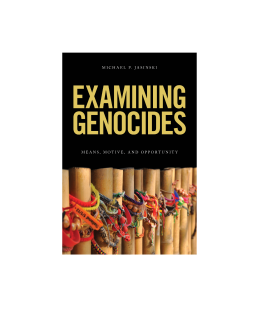
Additional Information
Book Details
Abstract
Mass killing through genocide haunts humanity as one of the most horrific forms of warfare. Scholars seek to understand what causes such violence, but it is still difficult to predict the onset of genocide. Why does violence sometime stop short of the genocide threshold, whilst others cross the threshold? Why do some genocides escalate to the point of triggering the state's collapse? Finally, why are some groups targeted and others spared?
Examining Genocide considers these questions by interrogating the interaction of three sets of conditions. These are: a societal crisis that creates a need for mass mobilization to “heal” the fractured public and address its material concerns; the stereotype associated with an “eligible target” for scapegoating; and the leadership preferences and skills of the chief executive of an authoritarian or poorly institutionalized state in question. Exploring case studies that cover various levels and instances of genocide, this book offers new insights to this highly researched field for scholars and students alike.
Examining Genocides is an attempt to understand events that seems to defy explanation. Jasinski (Univ. of Wisconsin-Oshkosh) takes a semi-legal perspective in his analysis, determining that genocide can occur only when there is proper means, motive, and opportunity. The window of opportunity consists of two elements—conditions in which scapegoating becomes advantageous and there is a collectivity available for scapegoating. However, opportunity alone is not enough for genocide to occur. After opportunity arises, there must be an intentional decision to exploit the opportunity, usually made by the political leaders of the country. Finally, the means to commit genocide must be within the control of the political entrepreneurs. After proposing these elements to genocide, Jasinski uses several cases of genocide to examine whether they follow the means, motive, opportunity trifecta. Jasinski’s material is interesting, but the material it is based on would serve most readers better in fully understanding the phenomena of genocide. Advanced students and scholars will find this work of interest. Summing Up: Recommended. Graduate students through faculty.
Michael P. Jasinski is Associate Professor of Political Science at the University of Wisconsin—Oshkosh. He is author of Social Trust, Anarchy, and International Conflict (Palgrave Macmillan, 2011) and has published in the Journal of Conflict Resolution.
Lucidly written and cogently argued. Jasinski so perceptively identifies the forces at play that have led to the most heinous crimes of our era.
Shay Pilnik, Executive Director of the Nathan and Esther Pelz Holocaust Resource Center of the Milwaukee Jewish Federation
Table of Contents
| Section Title | Page | Action | Price |
|---|---|---|---|
| Contents | 7 | ||
| Preface | 9 | ||
| 1 Introduction | 13 | ||
| 2 Genocide as Product of Means, Motive, and Opportunity | 21 | ||
| 3 Ottoman Empire and Turkey | 59 | ||
| 4 Germany in Two World Wars | 97 | ||
| 5 Eastern Europe and the Holocaust | 139 | ||
| 6 USSR and Cambodia | 177 | ||
| 7 The Rwanda Genocide | 213 | ||
| 8 Conclusions | 231 | ||
| Bibliography | 237 | ||
| Index | 245 |
